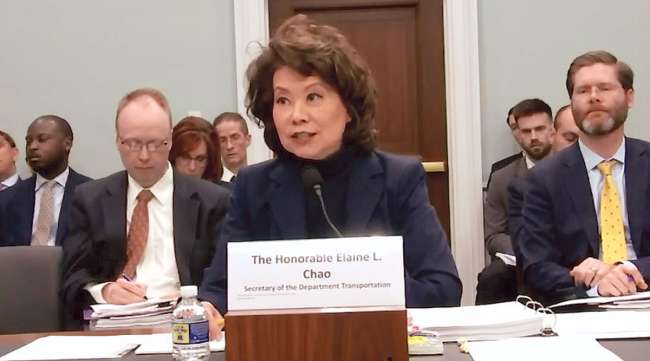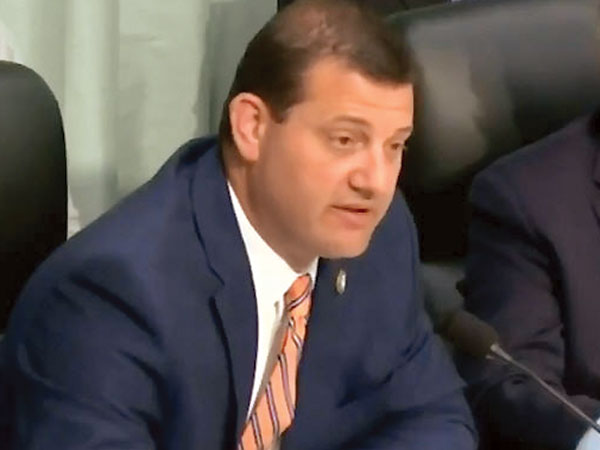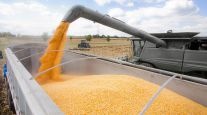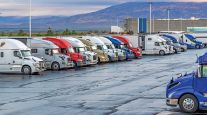Staff Reporter
Chao Stresses Continued Outreach to Ag Haulers on ELD, HOS Rules

The Federal Motor Carrier Safety Administration will continue to meet with and host briefings geared toward livestock haulers who are discontent with the electronic logging device rule, according to Transportation Secretary Elaine Chao.
Chao, who testified before a House Transportation, Housing and Urban Development subcommittee April 12, acknowledged that the ELD rule and hours-of-service laws are the scourge of many agriculture haulers whose cargo can spoil or perish if they experience delays or insufficient breaks.
HOS laws dictate when and how long truck drivers can operate. The purpose of HOS laws is to manage the amount of time drivers are on duty. The 14-hour driving window says drivers are allowed a period of 14 consecutive hours in which to drive up to 11 hours after being off-duty for 10 or more consecutive hours.
Chao said that recently confirmed FMCSA chief Ray Martinez has engaged in sessions with concerned truck operators, but she noted that the U.S. Department of Transportation as a whole is legislatively constrained by existing HOS rules.
“I have given [Martinez] the directive that among his first priorities is to meet the stakeholders who are concerned about this issue. This is a very difficult issue,” Chao said. “It really hits upon an underlying issue, which is the hours of service. The exemption is very strictly prescribed. We will do as much as we can within the intent of that statute, but we are limited in what we do.”
FMCSA has granted a reprieve to agriculture-related haulers in the face of the ELD mandate, which took effect Dec. 18. In March, the agency announced a 90-day extension of an existing 90-day waiver from the rule for those involved in the transport of agricultural cargo.
Lawmakers urged Chao to consider a longer-term solution to the HOS difficulties agriculture haulers contend with. Rep. David Young (R-Iowa) agreed with Chao that the underlying issue for livestock haulers was HOS and suggested that the department establish a permanent solution for these specific drivers. Young said he has invited FMCSA leaders to his district to meet with concerned truckers.

Valadao via HouseAppropsGOP on YouTube
Rep. David Valadao (R-Calif.) said a representative from a trucking outfit approached him earlier in the day April 12 and told him how one of his fellow drivers was pulled over and sidelined for eight hours with a truck full of animals. Valadao’s congressional district includes the San Joaquin Valley, a center of agricultural productivity.
“It is clear the ELD rule and existing hours-of-service rules do not properly accommodate this subset of the industry,” Valadao said.
Another one of the chief concerns among lawmakers was the solvency of the Highway Trust Fund, which provides financial backing for state infrastructure projects. The fund is bolstered by revenue collected from a federal tax on diesel (24.4 cents per gallon) and gasoline (18.4 cents). Improvements in fuel consumption and shifting driving habits have lowered the amount in the fund at a time when infrastructure overhauls are crucial.
Young noted that the Highway Trust Fund has not been self-sustaining in a while and challenged Chao to find a funding solution because it seems as though not everyone is “paying to play.” Chao floated ideas of a fuel-tax increase and vehicle-miles-traveled fees but acknowledged the administration has not landed on a solution.
“The wear and tear on roads is real. The truckers actually want a gas tax,” Chao said. “We don’t really have an agreement within the administration on how to proceed. I think we’re going to talk more and more about these issues.”
DOT’s fiscal 2019 budget was slashed by 19% in President Donald Trump’s proposed budget. The proposed budget unveiled in February requests $76.8 billion for DOT and calls for reducing spending for passenger rail systems and transit programs, and eliminating funding for some infrastructure grants.
“The budget is woefully inadequate to the task at hand,” said Rep. David Price (D-N.C.). “Infrastructure serves as the foundation for our economy and our quality of life.”




